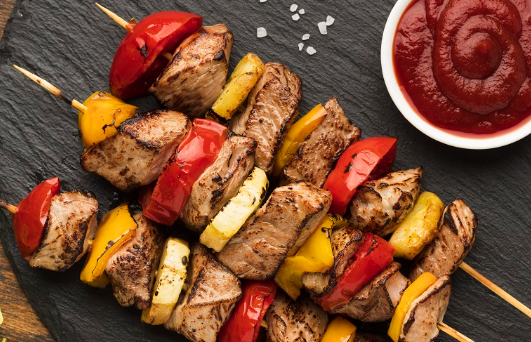Learn how to reduce harm from barbecue with these 8 simple life hacks. Follow these tips for a healthier grilling experience and enjoy your barbecue without worries.
Shish kebab, barbecue, grill: are these methods of cooking meat harmful? No, if you follow the cooking rules and don’t eat charred meat every day.
With the onset of warm weather, many will traditionally want to go outdoors to eat delicious, juicy meat baked on skewers or on a grill. However, there may be two dangers lurking here, which you should not forget about when going to a barbecue or barbecue. First, underheated or improperly cooked meat increases the risk of food poisoning. And secondly, if you eat charred, well-done meat too often, you risk getting cancer.
How to Reduce Harm from Barbecue: 8 Simple Life Hacks

1. Keep raw meat away from fruits , vegetables and other foods you plan to eat uncooked to avoid cross-contamination with pathogenic bacteria.
2. Cut raw meat on a separate board , and then thoroughly wash the cutting board, knife, and other utensils or surfaces that came into contact with the meat with detergent and hot running water.
3. Wash your hands with soap and warm water for at least 20 seconds both before cooking and after handling raw meat.
4. Keep raw meat and chicken in the refrigerator until you are ready to grill.
5. Make sure that the meat is properly heated during the baking process. To do this, insert a food thermometer into the thickest part of the meat and continue cooking until the internal temperature reaches the following values:
- whole chicken or turkey, chicken or turkey breast or ground: 73-75 degrees Celsius;
- hamburgers, minced meat and offal: 70-72 degrees Celsius;
- beef steaks or pieces of beef skewers: depending on the desired degree of doneness, from 63 (rare) to 77 (well done) degrees Celsius;
- pork (chops, steaks, fillets, necks, sliced kebabs): 63 degrees Celsius.
6. Keep cooked meat covered to prevent flies or other insects from crawling on it because they carry bacteria on their legs and bodies. It is possible that before becoming interested in your piece of meat, they visited a garbage dump.
What about the threat of cancer?
The fact is that both the mouth-watering mouth-watering smell and the charred edges of well-done steaks or pieces of barbecue are not very healthy.
When the rendered juices and fat from meat drip onto hot coals, volatile organic compounds called polycyclic aromatic hydrocarbons (PAHs) are formed.
And when meat is exposed to very high temperatures, muscle proteins fold and form substances called heterocyclic amines (HCAs).
The longer meat is grilled, the more HCAs it contains. The highest concentration of these compounds is precisely in the burnt, charred edges.
PAHs and HCAs are proven carcinogens, causing changes in cellular DNA leading to malignant degeneration of cells. One study found that people who prefer steaks very well done and eat them on a regular basis have a 60% increased risk of pancreatic cancer compared to those who either like rare meat or don’t eat it at all.
Another study demonstrated that the more PAHs and HCAs you consume in your diet, the higher your risk of colorectal adenoma, a benign precursor to colorectal cancer. In addition, regular consumption of deep-cooked grilled meats has been linked to an increased risk of colon, prostate, stomach and breast cancer.
This frightening information does not mean that you cannot treat yourself to a barbecue or barbecue from time to time. Here is a list of recommendations that will help you not be afraid of harming your health:
- Choose lean meat , and before cooking, additionally trim off the skin and existing fat, this way you will reduce the likelihood of charring and the formation of harmful volatile compounds.
- Cut the meat into small pieces , they will cook faster and the amount of carcinogens in them will be less.
- For large cuts of meat, partially cook them in the microwave or on the stove before adding them to the grill . Just 90 seconds in the microwave is enough to reduce the amount of moisture in the meat and reduce the chance of it charring or dripping.
- Turn the pieces over more often , so less HCAs are formed in them.
- Increase the distance between the coals and the meat.
- Just avoid eating charred areas of meat or trim them before serving.
- Use marinade. Research shows that marinating meat for just half an hour before charcoal grilling creates a barrier that reduces the level of HCAs in the finished product. You can add lemon juice, vinegar, olive oil, herbs and spices to the marinade.
- Add rosemary to meat or marinade. A 2010 study published in The Journal of Food Science found that compounds in rosemary help significantly reduce carcinogens in meat, in some cases by as much as 90%. A similar effect is observed in garlic, onions, lemon juice and honey.
